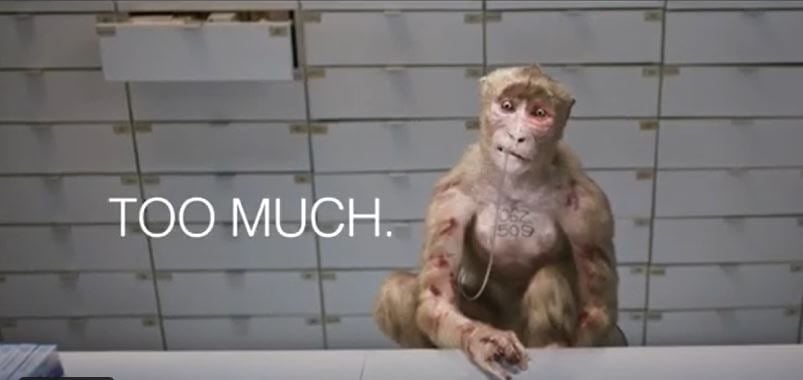Because experiments on monkeys at the University of California–Davis are so gruesome that no TV station could possibly air them, PETA used CGI to create a new video that reveals—without showing any real animals, gore, or blood—who pays the real price for pharmaceutical drugs tested on animals. But area TV stations are still refusing to run even this PG-rated, animated video, calling it “too graphic” and citing probable “viewer complaints.”
In the 15-second spot, a “customer” wants to know how much a prescription will cost—and a computer-generated monkey, tattooed with an ID number and wheezing through a breathing tube, has the answer: “Too much.”
“If a computer-generated monkey is ‘too much’ for TV, imagine how consumers would react to seeing real footage from UC-Davis’ laboratories, where monkeys are caged, mutilated, tormented, and killed for pointless experiments that don’t benefit human health,” says PETA Senior Vice President Kathy Guillermo. “PETA is rallying viewers to stand up against these real-life horrors and join us in calling on UC-Davis to pivot to sophisticated, human-relevant research methods.”
Even though studies show that 90% of all basic research—most of which involves animals—fails to lead to treatments for humans, UC-Davis is still imprisoning and tormenting more than 5,000 monkeys for experiments. The university houses the California National Primate Research Center, where experiments have involved inflicting spinal cord injuries on rhesus macaques, forcibly separating baby monkeys from their mothers, and cutting open the skulls of monkeys and screwing in metal implants.
While local ABC, NBC, and FOX affiliates have refused to run the monkey video, Comcast will air two others on local networks. In one, a computer-generated calf chained up behind a shop’s register and swarming with flies reveals that a wedge of cheese costs “too much”—as revealed in a PETA investigation into Daisy Farms—and in another, a computer-generated goat points out that cashmere costs “too much” for the goats who scream in pain as workers rip out their hair, as shown in PETA Asia’s investigations into the cashmere industry. Area movie theaters have also accepted the calf video. You can watch all the ads here.
PETA’s calf and goat videos will run via Comcast more than 2,000 times through November 26, and the calf video will be seen more than 3,000 times at Cinemark Roseville Galleria Mall and XD in Roseville and Century DOCO and XD in Sacramento through December 22.
PETA’s motto reads, “Animals are not ours to experiment on, eat, wear, use for entertainment, or abuse in any other way.” For more information, please visit PETA.org, listen to The PETA Podcast, or follow the group on X (formerly Twitter), Facebook, or Instagram.
The post ‘Too Graphic’: TV Stations Block PETA CGI Video Aimed at UC-Davis Monkey Laboratory appeared first on PETA.

